- Home
- Gore Vidal
Thieves Fall Out (Hard Case Crime)
Thieves Fall Out (Hard Case Crime) Read online
Contents
Cover
Acclaim for the Works of Gore Vidal!
Some Other Hard Case Crime Books You Will Enjoy
Title Page
Copyright
Chapter One
Chapter Two
Chapter Three
Chapter Four
Chapter Five
Chapter Six
Chapter Seven
Acclaim For
The Works of
GORE VIDAL!
“Few American writers can display the virtuosity of Gore Vidal.”
—New Republic
“Highly literate, stylish, entertaining, and provocative.”
—Wall Street Journal
“Superb…a grand entertainment.”
—Harold Bloom
“Magnificent.”
—Gabriel Garcia Marquez
“Always absorbing.”
—The New Yorker
“Extraordinarily intelligent and entertaining.”
—Newsweek
“Dazzling…wicked entertainment of a very high order.”
—New York Times
“What a fascinating book.”
—Atlantic Monthly
“A bravura tour de force.”
—Publishers Weekly
“A highly entertaining read, and a real page-turner.”
—Washington Times
“Simply great.”
—Associated Press
“A subtle, provoking, enthralling book…Vidal’s ability to invoke a world is amazing.”
—Christian Science Monitor
“A rich, colorful, and fulfilling tapestry.”
—San Diego Union
“Compelling and tumultuous…An adventure of mind and body during a dramatic, significant era, Vidal’s creation is confronting, stimulating, amusing, and unique.”
—Vogue
“Suspenseful and extravagantly decorated…Impossible to resist.”
—Cosmopolitan
“Vidal writes so well that you find yourself holding your breath over something that is a foregone conclusion.”
—Boston Globe
“Frank, shocking…extremely sympathetic, penetrating and exhortive.”
—New York Herald Tribune
“A superb story…Fascinating.”
—John Kenneth Galbraith
“A prodigiously skilled and clever performance.”
—Times Literary Supplement
“Richly entertaining.”
—Washington Post
“An excellent book.”
—Chicago Daily News
“One of the best novels of its kind.”
—Christopher Isherwood
“America’s most formidable man of letters.”
—Los Angeles Times
“Delectable…Savory…Vidal is the true heir of Oscar Wilde.”
—Bloomberg News
“[A] grand, teeming affair.”
—Time
“Mr. Vidal writes with an engaging freshness, which is rarely naïve, occasionally salacious and almost always entertaining.”
—Spectator
“One of America’s most distinguished writers.”
—Booklist
“Savage, bitter, bawdy, biting, and brilliant.”
—USA Today
“Wonderfully entertaining.”
—Daily Telegraph
“A preposterously good novel.”
—Sphere
“Vidal’s combination of learning, wit and disdain gets into your blood. He can change the way you think—the only definition of a great writer which makes sense.”
—Observer
“An outrageous, thumb-in-your-eye novel.”
—Vanity Fair
“A noble work…An important human document, of excellent and enlightening truthfulness.”
—Thomas Mann
“A seer and a scourge as well as an entertainer of the highest order.”
—Jay McInerney
“Provocateur, scholar, historian, novelist, scoundrel, whatever you want to call Gore Vidal, make sure you include ‘national treasure’…[He] is an original mind, who thinks and sees without regard to convention. That alone makes him required reading.”
—The Oregonian
“There is no one quite like him, and if you don’t know his work then you should.”
—The Times (UK)
The little man shook his great head. “I have been to many countries. I’ve done many things. Now I play piano at Le Couteau Rouge.”
“What do you know about a woman named Hélène de Rastignac, a French countess?”
Le Mouche sighed. “Many things. I know, for instance, that she is not French, but Alexandrian, and I know that she is not a countess.”
“But she is rich?”
“I shouldn’t be surprised.”
“Was she a spy in the war?”
“Everyone in Cairo was a spy. It was the thing to be.”
“Was she one?”
“I have no idea. She was the mistress, though, of Erich Raedermann, who was, as you may or may not know, the most important Nazi agent in Egypt.”
This was news. “What happened to him?”
“He was shot, I believe, while with her at their house. She buried him decently. Germany fell. She did not fall with it.”
“I met her through an Englishman named Hastings.”
Le Mouche whistled softly. “You move in very fast circles, Mr. Wells.”
“Too fast, maybe?”
“Maybe, yes. I should be very—circumspect, if I were you. This is not like any other country in the world. People can disappear in this country more completely than anywhere in the world, with the possible exception of Russia, and leave no trace.”
“What are you trying to tell me?”
“Only to take care, Mr. Wells. I should hate to see you come to harm…”
SOME OTHER HARD CASE CRIME BOOKS YOU WILL ENJOY:
MEMORY by Donald E. Westlake
NOBODY’S ANGEL by Jack Clark
MURDER IS MY BUSINESS by Brett Halliday
GETTING OFF by Lawrence Block
QUARRY’S EX by Max Allan Collins
THE CONSUMMATA by Mickey Spillane and Max Allan Collins
CHOKE HOLD by Christa Faust
THE COMEDY IS FINISHED by Donald E. Westlake
BLOOD ON THE MINK by Robert Silverberg
FALSE NEGATIVE by Joseph Koenig
THE TWENTY-YEAR DEATH by Ariel S. Winter
THE COCKTAIL WAITRESS by James M. Cain
SEDUCTION OF THE INNOCENT by Max Allan Collins
WEB OF THE CITY by Harlan Ellison
JOYLAND by Stephen King
THE SECRET LIVES OF MARRIED WOMEN by Elissa Wald
EASY GO by Michael Crichton writing as John Lange
THE WRONG QUARRY by Max Allan Collins
BORDERLINE by Lawrence Block
BRAINQUAKE by Samuel Fuller
EASY DEATH by Daniel Boyd
QUARRY’S CHOICE by Max Allan Collins
A HARD CASE CRIME BOOK
(HCC-119)
First Hard Case Crime edition: April 2015
Published by
Titan Books
A division of Titan Publishing Group Ltd
144 Southwark Street
London SE1 0UP
in collaboration with Winterfall LLC
Reprinted by an arrangement with
The Gore Vidal Revocable Trust
Cover painting copyright © 2015 by Glen Orbik
All rights reserved. No part of this book may be reproduced or transmitted in any form or by any electronic or mechanical means, includi
ng photocopying, recording or by any information storage and retrieval system, without the written permission of the publisher, except where permitted by law.
This book is a work of fiction. Names, characters, places, and incidents either are the products of the author’s imagination or are used fictitiously, and any resemblance to actual events or persons, living or dead, is entirely coincidental.
Print edition ISBN 978-1-78116-792-2
E-book ISBN 978-1-78329-248-6
Design direction by Max Phillips
www.maxphillips.net
The name “Hard Case Crime” and the Hard Case Crime logo are trademarks of Winterfall LLC. Hard Case Crime books are selected and edited by Charles Ardai.
Visit us on the web at www.HardCaseCrime.com
Chapter One
His dreams grew confused and ominous. Suddenly his muscles contracted in fear and he awoke, sweat cold on his body.
It took him several moments to bring the room into focus. His head throbbed and an ache behind his eyes made the bright sunlight unbearable.
The room was small. Strips of moldering yellow plaster hung from the lathes. The single window was tall, with broken shutters dangling crazily shut, slicing the light in zebra patterns on the warped floor.
The bed was the only piece of furniture in the room: a verminous mattress over springs. When he looked at it, he got to his feet in disgust, staggering a little. From far away he could hear a high toneless chanting. It was the sound that had awakened him, that he had heard in his dreams: the muezzin calling the Mohammedans to prayer, a strange, unearthly noise.
As he picked up his trousers, which lay crumpled on the floor beside the bed, someone began to pound on the door. Through wide cracks in the door’s panels he saw the outline of a woman.
“Come in,” he said, pulling on his trousers. Then, seeing that the door was bolted, he opened it for her.
She entered the room scowling, a dark-skinned woman wearing a loose robe. She was good-looking, in a heavy way, with large black eyes as bright and unblinking as a rat’s.
“American?” Her voice was deep and guttural.
He nodded, fastening his belt and reaching for his shirt. He could remember nothing, yet he was sure he had never seen her before. Vaguely he recalled having paid for a room.
“Money!” The word exploded in the room and she put out one hand in the universal gesture.
“Now, look here.…” He shoved his feet into his shoes awkwardly and stood up, working the heels into place.
A flood of abuse made him dizzy. Her hands opened and shut convulsively as she shouted at him, her black eyes large and brilliant. He edged toward the door. She put herself between him and the door, her hands clutching now at his clothes. He shoved her away. This was a mistake, for she immediately yelled for help. Help came in the form of five women of different age, weight, and beauty, but all sharing the same profession and dressed in similar loose robes, all shouting as they crowded about him on the rickety stairs outside the room.
Alarmed, he tried to make his way through this tiger-smelling group, but firm arms prevented him; hands grabbed at him fiercely. With a sudden lunge he broke free of them, and half running, half falling, got down the stairs to the street.
In an arcade two blocks away he paused, suddenly exhausted, sweating in the heat and slightly nauseated.
The bright Cairo noon dazzled his eyes. Shimmering waves of heat made the modern buildings across the wide street quiver as though they were fashioned of gray rubber. He turned his back on the street and looked down the arcade, where, in the shade, men wearing fezzes and sheetlike robes of plain white or striped cotton sat in doorways selling food and shoes and beads and sandals and Coca-Cola. Veiled women passed them without a look to right or left; idle men lounged against the blunt pillars of the arcade, watching the street, where modern cars from all the countries of the world drove gleaming past. He took a deep breath, inhaling all the strange odors of Cairo: musk and food, urine, drugs, filth, and sandalwood. This sudden wealth of new sensation pleased him and he felt better, though still shaky. He reached in the breast pocket of his sport shirt for cigarettes. They were gone. He had bought a pack only the evening before. It must have been a rough night, he thought, moving toward a booth where a grizzled, bearded villain was selling cigarettes.
It was when he came to pay for the cigarettes that he discovered he had been robbed. All his money and his American Express checks were gone. The double-buttoned back pocket where he kept them had been torn open.
Panic seized him as he gave the package of cigarettes back to the old man, who began to whine threateningly, implying that the value of his wares had been decreased by handling. In a daze he moved off down the arcade and retraced his steps to the pale blue building where he had spent the night. When he pounded on the door and shouted, there was no answer from inside. The windows were shuttered against the day and the inmates were invisible. Only a child with red-rimmed, diseased eyes watched him with interest, as he shook the door’s knob desperately.
* * *
He was given an audience with someone of almost no importance at the American Consulate.
The someone of no importance was young, disinterested, and disapproving. He sat behind a standard American desk in a small bare office with one window so high that the city could not be seen from it. But the noises could not be shut out, high, raucous, breathy Arab noises and, periodically, the unearthly sound of the faithful being called to prayer.
He started right in to tell the young official his story, but he was interrupted.
“I think we had better start from the beginning,” said Mr. Case, for so the discreet sign on his desk declared him, gold letters on black. “May I see your passport?”
The document was handed over. “Your name is Peter Wells?”
“That’s right.”
“You were born…”
“Salem, Oregon.”
“And you are…?”
“Thirty-one years and four months old in my stocking feet.” Pete Wells was beginning to dislike the young Mr. Case.
“What are you doing in Egypt?”
“Looking around.”
“Looking around for what?” The tone was cold and insulting.
Pete controlled himself. “I came here on a ship—worked my way as far as Alexandria on the freighter Roger Hale. I left the ship in Alexandria and came down to Cairo yesterday.”
“Why did you come to Cairo?”
“To look at the Sphinx.”
Mr. Case ignored the irony. “No tourists come to Cairo in the summer,” he said precisely. “July is one of the hottest months and there is cholera in many sections of the city.”
“I didn’t come for the cholera.”
“What, Mr. Wells, is your occupation?”
“My last job was as deck hand on the Roger Hale. Before that I was in the Army five years. Before that—”
“Then we shall list you as a merchant seaman.”
“Except for the fact that I lived in Texas and wildcatted, up to the war.”
“Wildcatted?”
“Prospected for oil.”
“There is no oil in Egypt.”
“Now look here, Mr. Case, I’m an American citizen, a first lieutenant in the U.S. Army Reserves. I came over here to look around. I’ve been robbed and I’m appealing to the government to do something about it.”
“It’s not the government’s…” but Mr. Case paused, deciding not to go into that routine just yet. He made tiny marks on a piece of paper; then he asked, “How much were you robbed of, and where, and how?”
“Three hundred and fifty dollars in American Express checks, about ten dollars in piasters, and my Social Security card.”
“How did you manage to save your passport?”
Pete shrugged. “It was in another pocket, in my shirt. I don’t know where I was robbed, but I have a pretty good idea it was the house where I woke up. You see, I think I was doped.”
“
Doped?”
“The last thing I remember was going into a dive a few blocks from here, about five o’clock yesterday afternoon. French place called Le Couteau Rouge. Next thing I knew, I woke up about an hour ago in a house with some woman I never saw before, Arab woman, asking me for money. Well, I couldn’t remember a thing, but I was sure I paid in advance, knowing those places, so I got out fast. Then I found out too late I’d been rolled.”
Mr. Case’s Puritan face was set in a mask of bleak disgust. “Then you don’t recall anything between Le Couteau Rouge and waking up this morning?”
“That’s about it.”
“What do you propose we do about this?”
“I was just going to ask you the same thing.” They looked at each other hostilely across the desk.
“I will report all this to the Consul General and we’ll see what we can do about getting the Express checks back. In the meantime…”
“I have no money.”
“I assume you have a bank account somewhere. The Consulate could probably help you get a check cashed.”
“The money I lost was all I have, anywhere,” said Pete.
“Your family…”
“No such thing.”
“Perhaps we could get you on an American ship, a deck-hand job. I assume you belong to the union.”
“I just got here,” said Pete reasonably. “Maybe you could get me a job.”
“Difficult,” said Mr. Case vaguely. “The Consulate doesn’t like this sort of thing.”
“Neither do I.”
“Where are you staying?”
“Hotel Stanley, Eugenie Street. I paid a week in advance yesterday, so I’ve got a place to stay for a few days, with meals.”
“Then consider yourself lucky. I’ll present your case to the Consul and we will let you know in a day or two if anything can be done.” He pushed back from his desk and looked at his watch impatiently; the interview was over.
“What am I going to do for money?” asked Pete, embarrassed by having to beg.
The official looked at him blankly. “I’m sure I don’t know,” he said.
“Well, thanks.” Pete got to his feet. “You wouldn’t happen to have a cigarette, would you?”
“I don’t smoke,” said Mr. Case; then he added, “Sorry,” which made it worse, but Pete Wells was already gone.
* * *
The Stanley Hotel was only a half-dozen crooked blocks away, a large nineteenth-century building, dilapidated, very English, with high ceilings to which were attached great lazy fans that made little difference in the damp gray heat.

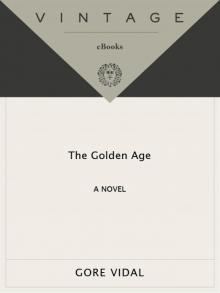 The Golden Age: A Novel
The Golden Age: A Novel Death Before Bedtime
Death Before Bedtime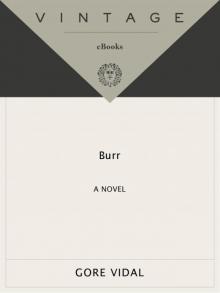 Burr
Burr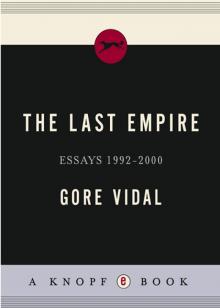 The Last Empire
The Last Empire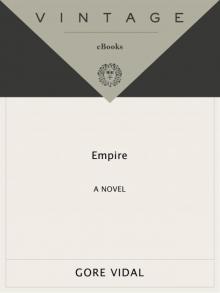 Empire: A Novel
Empire: A Novel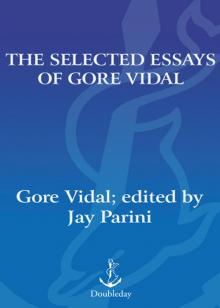 The Selected Essays of Gore Vidal
The Selected Essays of Gore Vidal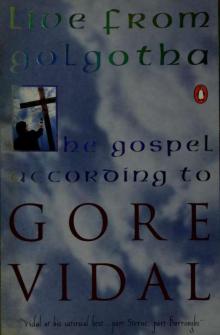 Live From Golgotha
Live From Golgotha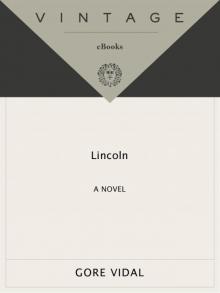 Lincoln
Lincoln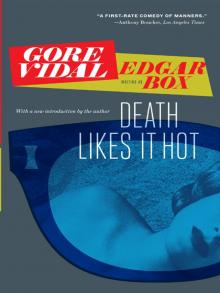 Death Likes It Hot
Death Likes It Hot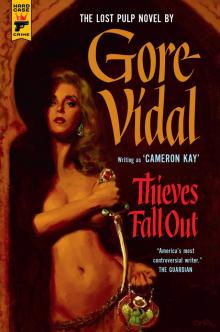 Thieves Fall Out (Hard Case Crime)
Thieves Fall Out (Hard Case Crime)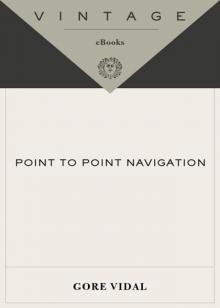 Point to Point Navigation
Point to Point Navigation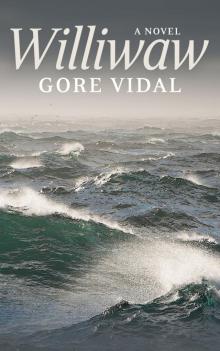 Williwaw
Williwaw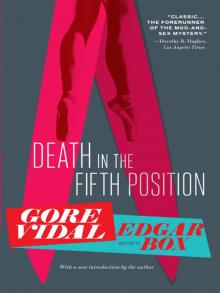 Death in the Fifth Position
Death in the Fifth Position In a Yellow Wood
In a Yellow Wood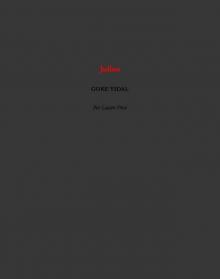 Julian
Julian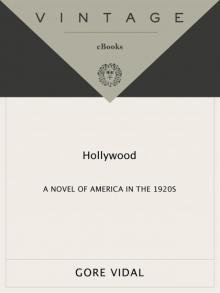 Hollywood
Hollywood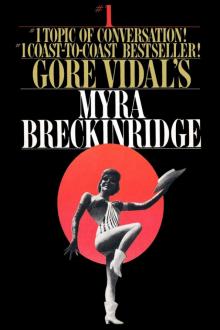 Myra Breckinridge
Myra Breckinridge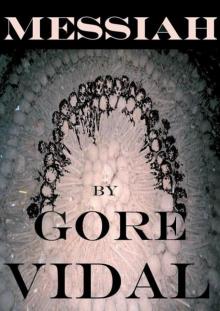 Messiah
Messiah The Second American Revolution and Other Essays 1976--1982
The Second American Revolution and Other Essays 1976--1982 Homage to Daniel Shays
Homage to Daniel Shays Empire
Empire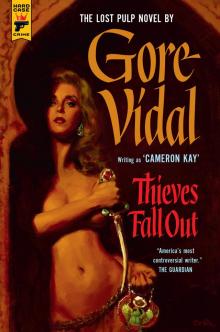 Thieves Fall Out
Thieves Fall Out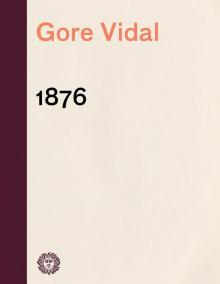 1876
1876 The City and the Pillar
The City and the Pillar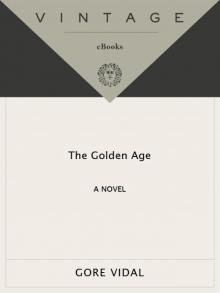 The Golden Age
The Golden Age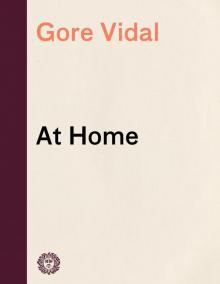 At Home
At Home